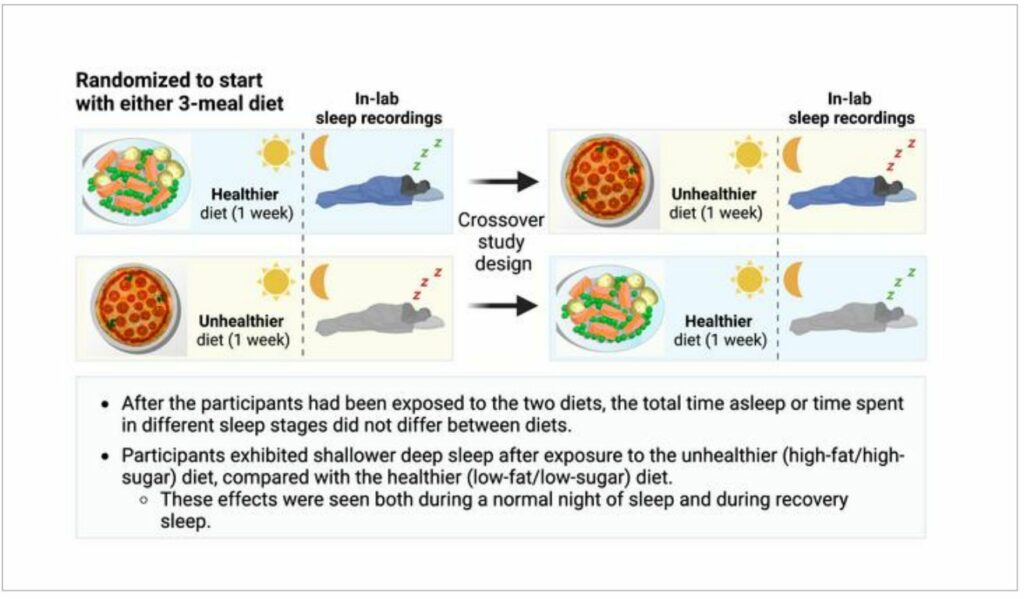New evidence suggests the potential detrimental effects of diet on sleep quality, emphasizing specific foods to avoid for better sleep.
Multiple epidemiological studies have established a link between our dietary choices and alterations in sleep patterns. However, only a limited number of studies have directly explored the specific impact of diet on sleep. One effective approach to investigate this connection involves subjecting the same individual to various diets in a randomized sequence.
Poor diet and insufficient sleep are both contributing factors that heighten the risk of various public health conditions.
Since nutrition has such a profound impact on our well-being, “we thought it would be interesting to investigate whether some of the health effects of different diets could involve changes to our sleep,” remarks author Jonathan Cedernaes.
“In this context, so-called intervention studies have so far been lacking; studies designed to allow the mechanistic effect of different diets on sleep to be isolated.”
Previous epidemiological studies have already established a correlation between diets high in sugar content and poor sleep quality. However, sleep is a complex interplay of various physiological states, as explained by Cedernaes:
While it’s known that our diet can affect deep sleep, no previous study has explored the impact of transitioning from an unhealthy diet to a healthy one on subsequent sleep quality in the same individuals. This aspect is particularly intriguing because sleep is a highly dynamic process. It comprises different stages, each serving distinct functions. For instance, deep sleep plays a crucial role in regulating hormonal release. Additionally, different stages of sleep exhibit unique patterns of electrical activity in the brain, which influence the restorative nature of sleep and can vary across different brain regions.
Factors such as insomnia and aging can negatively affect the depth and integrity of sleep stages. However, it remains unexplored whether exposure to different diets can induce similar changes in our sleep stages.
Each research session in this study involved an extensive monitoring period conducted within a sleep laboratory. As a result, a total of 15 individuals were included as participants to ensure thorough analysis. These participants were 15 healthy young men with normal weight, and they took part in two separate sessions.
Before the study commenced, the participants underwent a screening process to evaluate various aspects, including their sleep patterns. It was essential for their sleep habits to fall within the recommended range, which suggests an average duration of seven to nine hours of sleep per night.
In a randomized manner, the participants were assigned both a healthier diet and an unhealthier diet. The calorie content of the two diets was identical, customized to meet each individual’s specific daily requirements. Notably, the unhealthier diet contained higher levels of sugar and saturated fat, as well as a greater proportion of processed food items. The meals for each diet were scheduled at individually adjusted times, ensuring synchronization across both dietary conditions. Each diet was followed for a week, during which the participants’ sleep, activity levels, and meal schedules were meticulously monitored on an individual basis.

Following each dietary phase, the participants underwent examination within a sleep laboratory. Initially, they were allowed to experience a normal night’s sleep, while their brain activity was measured to monitor the quality of their sleep. Subsequently, the participants were purposefully kept awake in the laboratory before being granted an opportunity to compensate for the sleep deficit. Their sleep during this recovery period was also recorded for further analysis.
What they observed in the study was that regardless of the diet consumed, participants slept for the same duration. This remained consistent both during the periods when they followed the diets and after switching to an identical diet. Moreover, the time spent in various sleep stages remained similar across the two diets.
“But we were particularly interested in investigating the properties of their deep sleep. Specifically, we looked at slow-wave activity, a measure that can reflect how restorative deep sleep is.”
Interestingly, we found that when participants consumed junk food, their deep sleep exhibited reduced levels of slow-wave activity compared to when they consumed healthier food.
This effect persisted even after switching to an identical diet the following night. Essentially, an unhealthy diet resulted in shallower deep sleep. It is worth noting that similar alterations in sleep patterns occur with aging and conditions such as insomnia. This leads to the hypothesis that diet may potentially play a significant role in such sleep-related conditions.
The duration of the sleep effects caused by the unhealthier diet remains unknown, according to the researchers. The study did not explore whether the reduced depth of sleep could potentially impact functions regulated by deep sleep.
Cedernaes notes that conducting functional tests could provide fascinating insights, particularly regarding the impact on memory function, which is heavily influenced by sleep. Additionally, it remains a topic of great interest to ascertain the duration of the observed effects. Currently, the specific substances in an unhealthy diet that contribute to the decline in deep sleep are unknown.
Cedernaes suggests, “As in our case, unhealthy diets often contain both higher proportions of saturated fat and sugar and a lower proportion of dietary fibre. It would be interesting to investigate whether there is a particular molecular factor that plays a greater role.
“Our dietary intervention was also quite short, and both the sugar and fat content could have been higher. It is possible that an even unhealthier diet would have had more pronounced effects on sleep.”
Overall, the findings, published in the journal Obesity, suggest that Junk food could impair our deep sleep.
Image Credit: Getty
